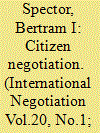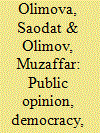|
|
|
Sort Order |
|
|
|
Items / Page
|
|
|
|
|
|
|
| Srl | Item |
| 1 |
ID:
166503


|
|
|
|
|
| Summary/Abstract |
Community renewable energy initiatives are increasingly recognized as important actors to trigger citizen investments in renewable energy facilities. Little is known, however, about the factors that determine the size of financial investments made by community renewable energy members. To address this gap, this paper presents a multivariate econometric analysis of the economic, social, environmental and institutional determinants of the size of investments in community renewable energy. It relies on a large-scale survey of 4061 members of two renewable energy cooperatives located in Flanders, in the northern part of Belgium. Results show that the return on investment is the most important determinant for members of large communities of interest, while environmental, social and other non-economic drivers tend to dominate financial motives for members of smaller communities of place. The presence of other cooperative members in close social networks plays a particularly important role in the latter kind of communities, highlighting the strength of social interactions as a driver for investments. These results can help policy-makers to design more adapted policy measures for fostering financial investments at the community level, and project developers to tailor segmented communication strategies about the goals and benefits of projects.
|
|
|
|
|
|
|
|
|
|
|
|
|
|
|
|
| 2 |
ID:
192729


|
|
|
|
|
| Summary/Abstract |
Citizen engagement with Sustainable Energy Solutions (SES) is considered essential for the current energy transition, since decarbonization requires individuals to shift from passive consumers to citizens actively involved with the energy system. However, citizen engagement research has remained peripheral and scattered, particularly in what regards the drivers of engagement behaviors.
To address this challenge, this study examines how different forms of perceived value of SES (utilitarian, social, and environmental) influence different types of citizen engagement behaviors (information seeking, proactive managing, sharing feedback, helping other users, and advocating). To this end, we developed a quantitative study in the context of a H2020 EU project, with a sample of 456 citizens from the city of Alkmaar (the Netherlands).
Our findings show that the utilitarian value of SES has a significant effect on all the engagement behaviors, except for sharing feedback. Social value has a significant influence on the more socially related engagement behaviors, such as sharing feedback, helping other users, and advocating. Finally, environmental value has an indirect effect on information seeking, proactive managing, and advocating, but only when mediated through awareness of consequences. The implications of this study should allow SES providers to design more relevant offerings and policymakers to develop better citizen engagement strategies.
|
|
|
|
|
|
|
|
|
|
|
|
|
|
|
|
| 3 |
ID:
137644


|
|
|
|
|
| Summary/Abstract |
Negotiation is becoming a more inclusive activity. More and different types of actors are taking part at national and international levels to resolve conflicts and seek agreement. At a national level, non-governmental organizations and individual citizens are partaking in mass demonstrations that often evolve into negotiation. At the international level, ngos working through issue networks have been participating more and more in formal negotiations with state parties. By reviewing several cases at these different levels, this article identifies useful questions for future research focusing on the sources of legitimacy and power of these new actors and how they are changing the organization, structure, process and outcomes of negotiation.
|
|
|
|
|
|
|
|
|
|
|
|
|
|
|
|
| 4 |
ID:
092398


|
|
|
|
|
| Publication |
2009.
|
| Summary/Abstract |
This paper reviews two contrasting approaches governments use to engage the citizen to promote better public policy outcomes: nudging citizens using the insights of behavioural economics, as summarised by Thaler and Sunstein (2009) or giving citizens the space to think through and debate solutions, as indicated by proponents of deliberative democracy. The paper summarises each approach, giving examples; then it compares and contrast them, illustrating their relative strengths and weaknesses. The paper concludes by suggesting that the approaches share some common features and policy-makers could useful draw upon both.
|
|
|
|
|
|
|
|
|
|
|
|
|
|
|
|
| 5 |
ID:
159261


|
|
|
|
|
| Summary/Abstract |
As Kazakhstan aims to become one of the top 30 developed countries by 2050, it is increasingly turning to ways which will improve its governance, one of which is greater participation by its citizens in the decision-making processes of state agencies. A new initiative aimed at doing just that, the establishment of public councils, received legal backing in January 2016. The aim of public councils is to ‘strengthen democracy and the quality and responsiveness of public polices’ through the ‘public expression of matters of concern to Kazakh citizens’. This article offers a formative evaluation of the role performed by public councils and questions the extent to which they have achieved this aim. It draws on primary data from public officials, non-governmental organizations, ministries, and non-participant observation of public councils in Kazakhstan. It finds limited evidence of their effectiveness to date.
|
|
|
|
|
|
|
|
|
|
|
|
|
|
|
|
| 6 |
ID:
134143


|
|
|
|
|
| Publication |
2014.
|
| Summary/Abstract |
Based on Tajikistan's experience, this article examines the evolution of views, values, and preferences of the population of the Central Asian (CA) countries that support the sustainability of their political regimes. Based on public opinion poll results, this article presents the population's preferences regarding the political system, sheds light on its attitude toward state power and its institutions, and gives assessments of the current regime and efficiency of different forms of citizen engagement. It also looks at the ways citizens participate in state governance and how effectively value judgments are being implemented.
The paper shows that despite the differences in the traditional social institutions of the CA states, as well as in the development paths they have chosen, they are all evolving according to the neopatrimonialism model. However, the evolution of political views in the CA societies shows that democratic values and preferences continue to occupy an important place in the mass consciousness. From this it follows that the government's necessitated support of certain elements of democracy is generated not only by its desire to create a façade or its willingness to make concessions to foreign donors and the international community, but also by social pressure. At the same time, the population's political views and preferences are contradictory and fragmented. They form the base for mass support of democracy, on the one hand, and for social consensus regarding restrictions of citizen rights and recognition of the privileges of heads of state, including patrimonial supremacy, on the other.
|
|
|
|
|
|
|
|
|
|
|
|
|
|
|
|
| 7 |
ID:
180097


|
|
|
|
|
| Summary/Abstract |
Local authorities in the United Kingdom are recognised by central government as key agents to achieving the national net zero target aimed at stabilising global temperatures at or below 1.5 degrees in line with the Paris Climate Agreement. Since 2018, over 75% of local authorities have declared climate emergencies committing to achieving net zero greenhouse gas emissions. This paper presents the findings of a review of official public records published by 308 local authorities, City Regions and Combined Authorities declaring climate emergencies. Significant variability and ambiguity were found in their scope of commitment, delivery planning arrangements and funding plans. Few local authorities have embraced the concept of Citizens’ Climate Assemblies as a way of engaging civil society. A follow-up review showed that although there is near uniformity of political desire to tackle climate change, action planning is very much work in progress with tight delivery timelines for the majority, significant divergence in approaches, and an unclear role for the citizen. The research concludes that without a local-authority specific Net Zero duty and well-designed and financed delivery models, local authorities will choose their own routes and finishing lines shaped by a complex ecosystem of internal and external factors. A governance framework is proposed based on the concept of local area climate contracts to bring together national and local Net Zero ambitions.
|
|
|
|
|
|
|
|
|
|
|
|
|
|
|
|
| 8 |
ID:
190618


|
|
|
|
|
| Summary/Abstract |
District heating (DH) schemes linked to Energy from Waste (EfW) and Biomass facilities have been championed for their potential to decarbonise heating yet their role in energy policy is contested. These schemes are a unique intersection between two vital environmental policy agendas - waste and energy - and can offer opportunities for citizens to affect both environmental agendas and future energy infrastructures.
Much has been written on the technical opportunities of DH and its policy landscape. This paper explores an important missing piece, to explore to what extent and how DH schemes support citizen engagement in local heat infrastructure decision-making. The benefits of citizen engagement are understood but there is currently no clear and consistent implementation of stakeholder engagement policy in this area. Evidence from four qualitative case studies is presented from the UK and Sweden to investigate strategies used by developers and operators to engage with stakeholders and how this influences their decision-making. However, limited examples of bottom-up, unplanned moments of citizen engagement were found as practice fails to live up to theory and policy rhetoric: ownership structures came through in our research as a key factor in this disconnect.
|
|
|
|
|
|
|
|
|
|
|
|
|
|
|
|
| 9 |
ID:
177872


|
|
|
|
|
| Summary/Abstract |
What factors affect citizens’ engagement with the state? We explore this question through a study of victims’ and bystanders’ willingness to report crimes to the police, using data from survey experiments conducted in Russia and Georgia. We find that citizens’ willingness to report in both countries is strongly influenced by the nature of the crime, but not generally by instruments that the state might use to encourage greater reporting. Our results recommend scepticism about the ability of governments to easily engineer citizens’ engagement with the state.
|
|
|
|
|
|
|
|
|
|
|
|
|
|
|
|
|
|
|
|
|